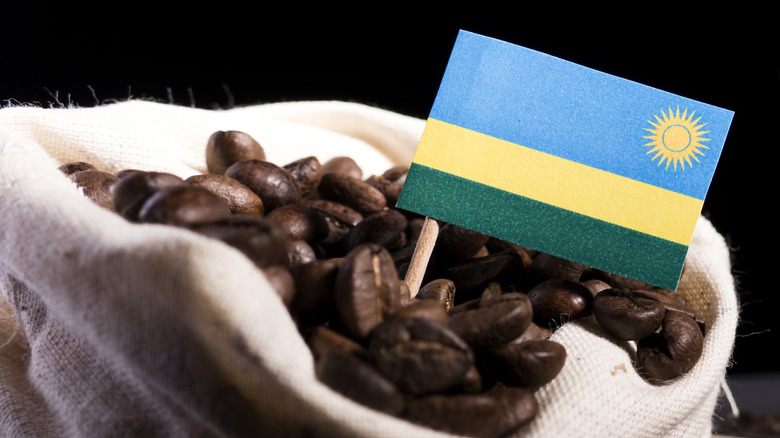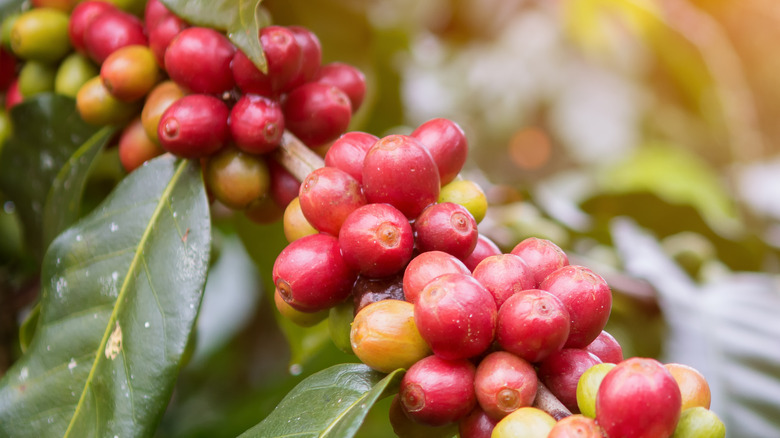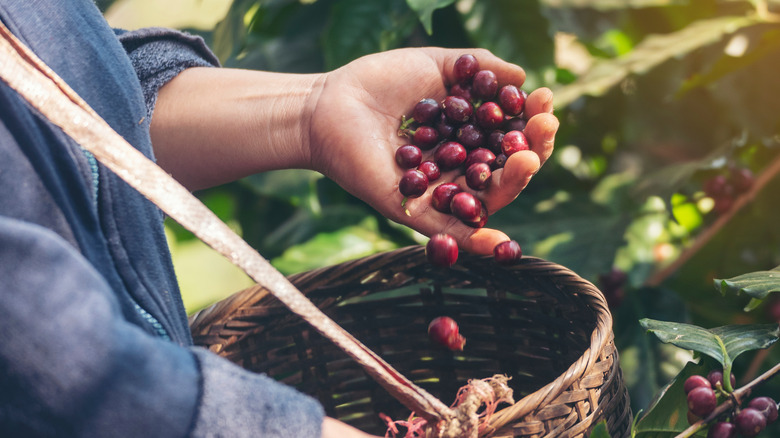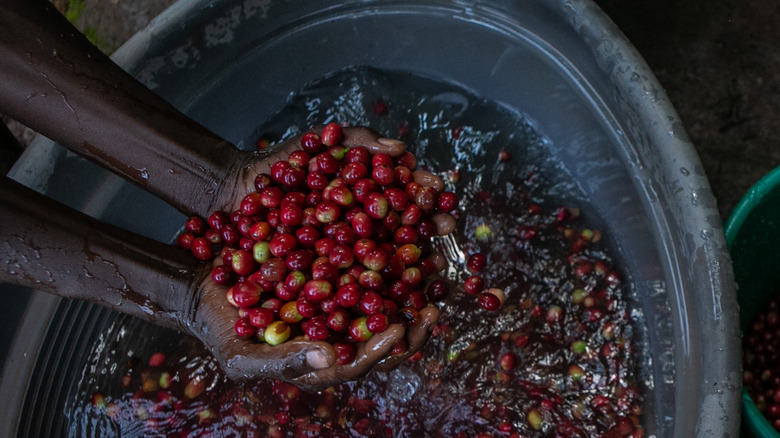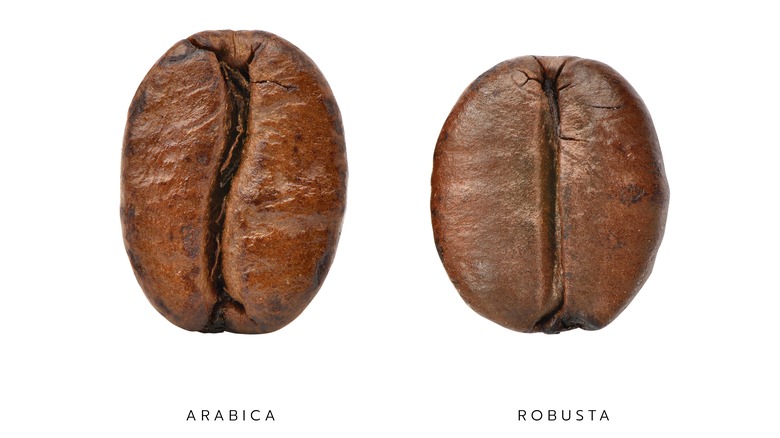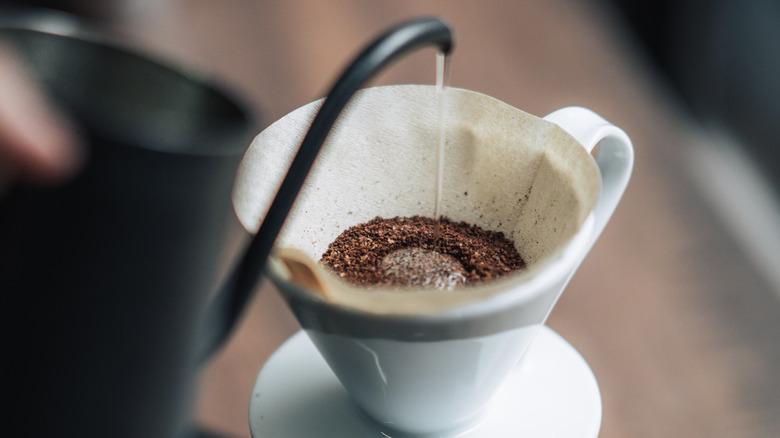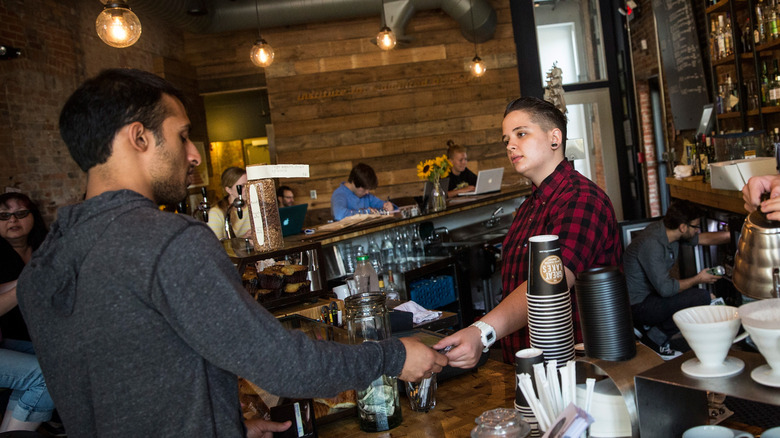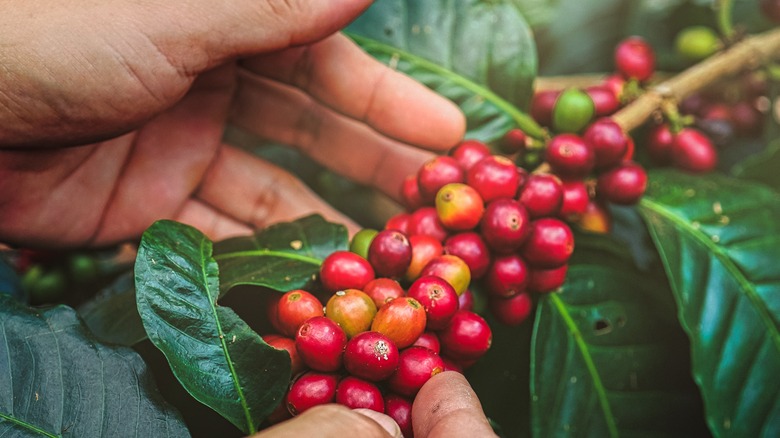The Floral And Fruity Notes Of Rwandan Coffee
The nation of Rwanda is a landlocked country in eastern Africa. It borders Burundi, the Democratic Republic of the Congo, Uganda, and Tanzania. The French have long referred to Rwanda as "le pas de mille collines" or "the land of a thousand hills" (via Britannica). This title is fitting, for it is due to Rwanda's elevation and unique mix of soil quality and temperature that makes it an ideal location for growing Arabica coffee.
The Rwandan coffee industry is an enormous economic force for this small African nation. According to Home Grounds, Rwanda's world-renowned coffee is produced by over 400,000 independent, small-producing family farms, many of which have been given direct aid from the United States Agency of International Development during the 29 years since the Rwandan genocide of 1994.
It is important to note that the coffee grown in Rwanda is not simply a commodity intended to be turned into a forgettable supermarket brand. Coffee grown in Rwanda, according to Espresso and Coffee Guide, is of the highest possible quality. Known for its floral and fruity notes, Rwandan coffee has become prized throughout the specialty coffee world, providing this small, landlocked nation with a well-earned reputation for production excellence.
What is Rwandan coffee?
Coffee plants are grown all around the world and share similar characteristics with one another. All coffee trees grow branches with waxy green leaves and colorful cherries. These cherries contain beans that end up being dried and roasted, per The Roasterie Coffee Co. What makes Rwandan coffee particularly fascinating, however, is the history behind it.
Though German missionaries introduced coffee plants to Rwanda in 1904, the industry did not begin in earnest until the 1930s. Rwanda, then a member of Belgium's African empire, produced massive quantities of coffee that were sold throughout Europe. Though an economic powerhouse for the Belgians, their control of prices and high export taxes left native Rwandan farmers with very little profit for their efforts. The resulting coffee was of poor quality and viewed in Europe as mere filler for higher-grade beans (via Perfect Daily Grind).
Taking note of this history, why does Rwanda's present coffee industry have a reputation for excellence? The answer lies in the rebuilding efforts of post-genocide Rwanda. While it may seem callous to say, the Rwandan genocide had a significant role in launching a total revival of the nation's coffee industry. A combination of international assistance, industrial trends towards justice, interest in origin, and the rise of specialty coffee has helped develop communal washing stations, improved shipping routes, and increased job growth. All of these factors have made Rwandan coffee sought after and prized in the specialty market (via Kivu Noir Coffee).
Where and how is coffee grown in Rwanda?
Virtually all of Rwanda's 400,000 coffee farms exist within the nation's five coffee-growing regions: Kizi Rift, Kivu, Virunga, Muhazi, and Akagera. The naturally high elevation, typically between 4,000 to 6,000 feet above sea level, allows for growing conditions that continually produce top-quality coffee (via Home Grounds).
According to Muthaland Coffee, elevations vary within each region, leading to differing flavor results. Virunga, at 7,000 feet, has a microclimate that continually produces some of the nation's best coffee. However, elevation, while important, is not the only factor at play. Coffee grown in the volcanic soil of Kivu tends to have an earthier tone, while beans from the Kizi Rift excel as lighter roast coffees with notes of citrus and chocolate.
In general, it takes between three to five years for a coffee tree to mature to the state where it is ready to bear fruit. Rwanda's high hillsides and temperate climate yield a harvest that lasts from March to July. Once ripe, the cherries are picked by hand, amassed, and sent to a collective washing station. There, the farmers will receive their initial payment for the raw product. If the station is able to get a good price for the processed beans, the farmers will receive another payment once the green coffee is sold wholesale to international roasters (via TechnoServe).
The washing process
Rwandan coffee is almost exclusively processed using the wet washing method. As seen in this explanatory YouTube video by Cafe Imports, wet processing is a method by which the coffee beans are washed in water to remove the outer cherry so that nothing remains but bean and parchment. Proponents of this method say that without the funky, fruity fermentation that can occur when coffee is dried in the cherry, as occurs using the natural method of processing, washed coffee brings out the more vibrant notes of the bean as no other components are competing when it comes time for roasting, as Backyard Beans explains.
Rwanda has a unique setup when it comes to coffee processing. Communal washing stations, located nationwide, are owned by intermediary producers who sell products and provide farmers with payment. Only accepting the very best crop, the cherries are hand sorted in order to weed out any imperfections. As farmers are free to use any station they like, owners make it a point to build good relationships with the farmers by offering competitive prices for the accepted cherries (via Nordic Approach).
As the purpose of the washing process is to strip away the outer shell and the underlying mucilage, the cherries need to be washed, dried, and washed again so nothing is left but a thin parchment layer and the bean itself. Once fermented and fully dried, the beans are bagged and shipped out to roasting companies.
Arabica vs Robusta
On the ever-growing list of why Rwandan coffee is so unique is the fact that 98% of all coffee grown in the country are Arabica beans, specifically the Bourbon variety. Bourbon Arabica trees are noted for their medium bean size, relatively low cherry yield, susceptibility to diseases such as leaf rust and coffee berry disease, and pests like nematodes. While these factors may seem like a deterrent towards growing, over 95% of Rwanda's Arabica yield is Bourbon beans, per Sustainable Harvest. Altitude plays a role in this abundance, as Bourbon trees thrive at high altitudes found in the Land of a Thousand Hills.
Of the four main types of coffee — Arabica, Robusta, Liberica, and Excelsa — Arabica is the most widely grown, mostly due to its numerous varietals, such as Bourbons. Next to Arabica in terms of production amount is Robusta. This coffee is far stronger, both in caffeine and flavor than Arabica beans, according to Perk Coffee. Robusta coffees tend to be darker and more intense, offering up grainy flavors as opposed to the lighter, floral, and citrus notes of an Arabica.
What does Rwandan coffee taste like?
Rwandan coffee has a well-earned reputation for being both fruity and floral. However, according to Home Grounds, there are continuous and familiar notes that run through all the coffee produced in Rwanda's various regions. (This is likely due to the fact that they're nearly all Bourbon beans). Elements of citrus, such as orange blossom and lemon, as well as red currants, berries, caramel, and white chocolate, are present with every sip.
These flavors, while common, are not exclusive. According to Bourbon Coffee, elements of clover honey and pecans help make the volcanically grown beans from Virunga and Kivu excellent for espresso. Meanwhile, beans from Akagera are alive with hints of black tea, cardamom, black pepper, and blackberry. These subtler, more fruity flavors lend themselves well to drip or pour over.
There is no metric that actively tracks what flavors emerge from the coffee beans once they are roasted, as each roaster has its own techniques. However, the unique soil and growing characteristics of Rwanda, particularly the elevation and small-scale production, as well as concentrated varietal growing efforts, make for exceptionally consistent products.
Brewing Rwandan coffee
As with all coffee, there are certain brewing methods that suit Rwandan coffee best. Chiefly, pour over and drip coffee are going to give you the best outcomes. Pour over, in particular, is able to pick up the subtitles from the coffee that high pressure or immersion methods, like a French Press or espresso. These techniques tend to mute the more delicate characteristics of a Rwandan roast, per Home Grounds. However, as Bourbon Coffee points out, provided they are from the right region and have the right flavor profile, there are certain Rwandan roasts that lend themselves well to espresso machines. With apologies to France, the press is right out the door on this one.
The grind size is another important element to take into account. This is true for brewing any variety of coffee, but it's especially important with Rwanda's, as its flavor profile is more delicate than most. For pour over in a Chemex, you'll want to have a medium-coarse grind. It is not a rough grind or loose grind but something between medium and fine. The coffee granules should be small without turning to powder. The point of grinding in this way is so the coffee will bloom and saturate completely as it is being brewed, according to The Commons Cafe. This way, you get the most flavor possible from a small number of beans.
Where to buy Rwandan coffee
Chances are you are not going to find a Rwanda roast coffee at your local grocery store. The reason for this, mainly, is that Rwanda specifically grows coffee for the specialty market. So, your best bet is to go directly to an independent, specialty coffee roaster, such as Rwanda Bean Coffee in Portland, Maine. There is a philanthropic element that goes into buying Rwandan coffee as well. Taking Rwanda Bean as an example, the company's mission is to take into account Rwanda's troubled past. Through coffee, they hope to help bring the country into a brighter future through funds for health insurance, daycare for children, and living wages for farmers. Owned and operated by Rwandan immigrant Mike Mwenedata, Rwanda Bean's aim is to build a community of support for a nation still reeling from decades of societal injustice and genocide.
There is no single buyer for Rwandan coffee beans, however. Several specialty coffee companies, such as Willoughby's Coffee and Tea, Bourbon Coffee, and Fresh Roasted, all offer Rwandan roasts. If you're close to a specialty coffee roaster or cafe, chances are they have a Rwandan roast to offer. You can also buy online. Starbucks, however, offers a mainstream Rwanda Abkaundakawa Reserve blend. So, it is not as though you'll need to go to extreme lengths to find these coffee beans. Thanks to modern tastes, a philanthropic mindset, and rising interest in coffee sourcing, Rwandan roasts only continue to rise in popularity and availability.
Nutritional facts
Like with all things food or drink related, Rwandan coffee has its benefits and downsides. We'll start with the good. Healthline informs us that coffee, in general, is extremely high in essential vitamins, nutrients, and several antioxidants such as Vitamins B1, B2, B3, and B5. In a standard 8-ounce cup, you'll also be ingesting folate, magnesium, manganese, potassium, and phosphorus, all of which the body needs in order to properly regulate and function.
Meanwhile, the downside to coffee, as we all know, is caffeine. Despite being the reason we all drink coffee in the first place, caffeine is nevertheless a stimulant that, consumed in excess, can have damaging results. As the Mayo Clinic states, overconsumption of caffeine has been known to disrupt sleep cycles, cause headaches, and increase irritability, anxiety, and heart rate.
As Rwanda grows almost exclusively Arabica coffee beans, its worth noting that 100% Arabica coffee contains extra nutritional benefits. Coffee naturally contains no calories, but Arabica coffee, according to the USDA, has trace amounts of additional protein and calcium. Another plus to drinking coffee is that, unless you're adding things like milk or sugar, there is no cholesterol or additional fats. So, overall, if you don't overdo it with the caffeine, coffee has the potential to be pretty darn healthy.
Other varieties
While Rwandan coffee production is almost exclusively of the Bourbon Arabica variety, there are two other varietals that deserve recognition as playing important roles in the industry. According to the Rwanda Development Board, both Caturra and Catuai trees are grown alongside French Missionary and Red Bourbon trees, though not in nearly as large quantities.
According to World Coffee Research, Caturra is closely related to the Bourbon line of Arabica beans. Caturra grows as a dwarf tree and is still subject to various diseases. However, Caturra is more susceptible than traditional Bourbons as it does not grow particularly well at high altitudes. Apart from this, the flavor of Caturra coffee is very balanced and includes touches of citrus, maple, and honey, per MTPAK.
Catuai trees, on the other hand, are their own separate Arabica variety. According to Perfect Daily Grind, these beans are abundantly grown in South America and are processed in the natural dry method. While a Rwandan wet wash would likely yield a less fermented fruit taste to the coffee, Catuai is nevertheless consistently described as having flavor reminiscent of chocolate, honey, nutmeg, and spices. So it stands to reason, whether you're purchasing bourbons or not, Rwandan coffee is going to remain a quality product for years to come. And with that, hope and healing can continue in a country with such a troubled past.
